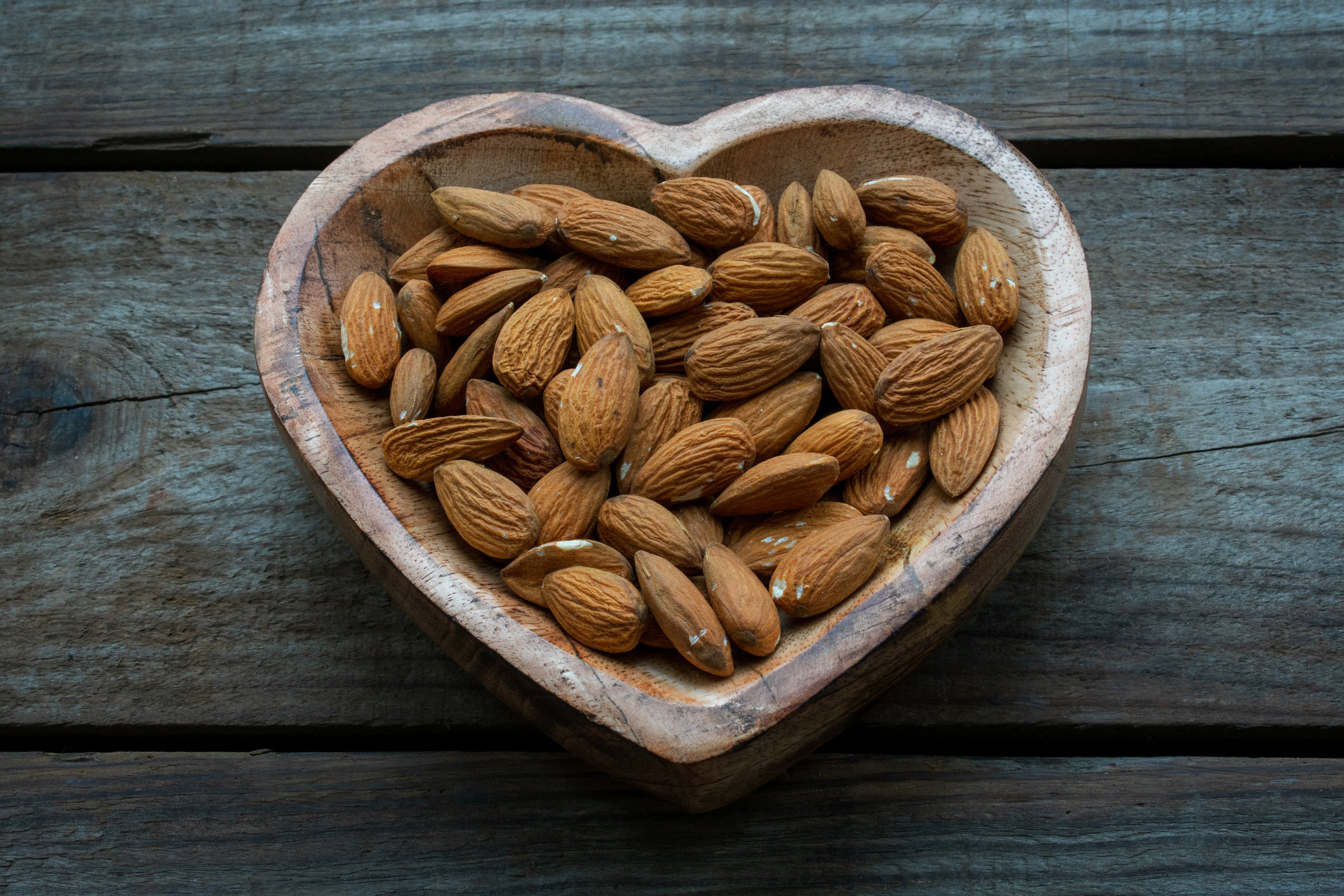Get Easy Health Digest™ in your inbox and don’t miss a thing when you subscribe today. Plus, get the free bonus report, Mother Nature’s Tips, Tricks and Remedies for Cholesterol, Blood Pressure & Blood Sugar as my way of saying welcome to the community!
The snack habit that lowers cholesterol and heart disease risk

When you’re craving a snack, you have two choices. You can reach for something salty, crunchy and processed (like potato chips) that won’t do your heart health any favors. Or you can reach for something that’s just as satisfying but also improves your cholesterol, blood vessel health and cardiovascular disease risk.
Sounds like a no brainer to me. But what is this heart-healthy food that can satisfy your cravings and get you on the road to healthier snack habits?
It’s almonds.
By now, you’ve probably heard just how much nuts can do for your health. Research shows that a simple serving of nuts daily can lower inflammation levels, heal your gut, improve your brain health and help you live longer. And it turns out, nuts in general and almonds, in particular, are fantastic for your heart health too.
One 2018 study found that eating nuts reduced the risk of two heart conditions — heart failure and atrial fibrillation. And now a new study shows that almonds can improve blood vessel health and reduce cholesterol, two important markers of heart disease risk. Let the snacking begin!
Almonds can lower heart disease risk by 32 percent
A recent study from researchers at King’s College London shows that replacing less healthy snacks with almonds can improve endothelial function (a key indicator of blood vessel health) and lower “bad” LDL-cholesterol.
The study included people between 30 and 70 years old who had a higher-than-average risk of cardiovascular disease. Researchers broke these people up into two groups. Half of them ate whole, roasted almonds as snacks over a six-week period and the other half ate mini muffins as snacks.
After the six weeks were up, people eating almonds experienced some serious heart health benefits. First off, their endothelial function improved. The endothelium is a tissue that lines blood vessels (as well as other parts of the body). When endothelial function declines, it’s usually an indication that you’re at risk for strokes and heart attacks. So, an improvement in endothelial function is a boon for your heart health.
People who snacked on almonds also had lower LDL cholesterol levels. As you know, high LDL cholesterol is linked to a higher risk of heart disease. In fact, researchers determined that the decrease in LDL cholesterol combined with the improved endothelial function reduced heart disease risk in almond eaters by about 32 percent.
Related: AFIB and heart failure protection you can snack on
But the good news doesn’t stop there…
The same researchers who conducted this study also conducted another recent study on the health benefits of almonds. In that study, they looked at a four-day food diary from 6,802 adults. They found that people who ate almonds had a lower waist circumference by 2.1 cm and a lower body mass index by 17 pounds per square meter.
Add almonds to your snack supply
So, if you’re ready to start slashing your heart disease risk with your snack choices (rather than adding to it), choose almonds. They’re packed with:
- Fiber
- Protein
- Healthy fats
- Vitamin E
- Manganese
- Magnesium
- Copper
- Vitamin B2
- Phosphorus
In the study, people ate whole, roasted almonds, but raw almonds are a great choice as well. In fact, they tend to contain a bit more nutrients, since some nutrients are lost during the roasting process. But if you prefer the taste of roasted almonds, no worries — they’re still super healthy and nutrient-dense.
If you decide to go the raw route, you should know that the raw almonds you buy in the store aren’t totally raw technically. The USDA requires that they’re pasteurized, which means they’re cooked a little to kill bacteria.
Unfortunately, in some cases, a carcinogenic chemical known as propylene oxide (PPO) is used during the pasteurization process. You can avoid PPO by choosing almonds that were steam pasteurized or by buying organic almonds (PPO isn’t allowed in organic food). Whatever type of almonds you choose, try to eat around a handful of these healthy nuts per day to keep your heart health in good shape.
Editor’s note: There are perfectly safe and natural ways to decrease your risk of blood clots including the 25-cent vitamin, the nutrient that acts as a natural blood thinner and the powerful herb that helps clear plaque. To discover these and other secrets of long-lived hearts, click here for Hushed Up Natural Heart Cures and Common Misconceptions of Popular Heart Treatments!
Sources:
- Eating almonds can improve vascular health, study finds — MedicalXpress.
- Whole almond consumption is associated with better diet quality and cardiovascular disease risk factors in the UK adult population: National Diet and Nutrition Survey (NDNS) 2008–2017 — European Journal of Nutrition.
- Snacking on whole almonds for 6 weeks improves endothelial function and lowers LDL cholesterol but does not affect liver fat and other cardiometabolic risk factors in healthy adults: the ATTIS study, a randomized controlled trial — The American Journal of Clinical Nutrition.
- Endothelial Function Testing — Cedars Sinai.
- Why Raw Almonds Aren’t Actually Raw — Cooking Light.
- 9 Evidence-Based Health Benefits of Almonds — Healthline.
- Raw vs Roasted Nuts: Which Is Healthier? — Healthline.













